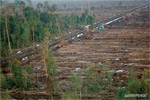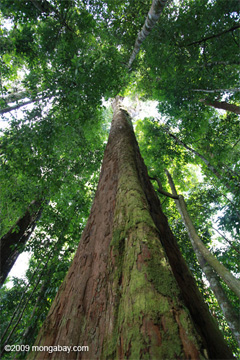A group of scientists have called upon the governments of Indonesia and Norway to recognize the conservation value of logged-over and “degraded” forests under their partnership on reducing emissions from deforestation and degradation.
The letter urges the Indonesian government to extend protection to forest areas that may not be pristine but still serve as important carbon sinks, house endangered wildlife, and provide livelihoods for communities.
The scientists note that while the original letter of intent that spelled out the terms of the partnership between Indonesia and Norway mentioned conservation of “natural forests”, subsequent statements from ministers have at times only referred to “primary forests”. Some fear the posturing is an attempt to backslide on the agreement, allowing industrial interests to convert selectively logged forests, which account for the bulk of Indonesia’s remaining forest and often contain 70-80 percent of the biodiversity found in untouched forest, to timber and pulp and paper plantations.
|
|
The letter comes shortly after another group of scientists published a complaint against two front groups working on behalf of Sinar Mas, a conglomerate that controls Asia Pulp & Paper, a paper products brand; and palm oil producers Golden Agri Resources and SMART. That group of scientists accused U.S.-based World Growth International and Australia-based ITS Global—both led by Alan Oxley, an industrial lobbyist—of using deceptive practices in claiming that logging, wood-pulp, and palm oil companies are not important drivers of deforestation.
According to the most recent data on land cover change, Indonesia has now surpassed Brazil as the world’s biggest deforester. Indonesia is now among the top greenhouse gas emitting countries. The vast majority of its carbon emissions result from deforestation and degradation of peatlands.
Dr. H. Susilo Bambang Yudhoyono
President, Republic of Indonesia
Gedung Bina Graha Jl. Veteran 16
Jakarta Pusat
Mr Jens Stoltenberg
Prime Minister of Norway
P.B. 8001 Dep
0030 Oslo
November 18th 2010
Your Excellencies,
As scientists who study tropical forest ecosystems, we would like to commend the Indonesian government for its commitment to tackling deforestation as well as the Norwegian government for the support it is providing to help Indonesia achieve this.
We would like to emphasize how important it is that both governments ensure the agreement currently under discussion not only ensures a reduction in greenhouse gas emissions, but also supports the conservation of Indonesia’s rich and diverse forest ecosystems, which provide livelihoods for millions of people and sustain biodiversity. For decades, some of the world’s most charismatic wildlife, including orangutans, tigers, Asian elephants and rhinos, clouded leopards, and countless other endemic and rare species, have experienced extreme pressure as their forest habitats have disappeared.
A moratorium on the granting of new concession licenses for plantations on natural forest and peatland areas for two years provides a strong starting point to help with such protection, but only if the right safeguards are established from the beginning.
One crucial issue that we feel compelled to raise surrounds the need for protection to include logged forests of high conservation value in addition to unlogged or ‘primary forests’. Certainly, all remaining primary forests must be protected, but any tract of forest should be assessed for its current and potential future conservation value.
This matters because whilst the original ‘Letter of Intent’ between Indonesia and Norway stated that ‘natural forests’ would be protected, recent press reports suggest that only ‘primary forests’ will be protected (see also Reuters).
Government officials have been reported to state that plantation expansion will still be possible because “degraded land and forest” could still be licensed for agricultural use. Indeed, last month the Indonesian forestry minister told the Jakarta Post that “idle forest areas other than primary forests and peatlands” would be available for cultivation. We note with concern that there is still no official Government definition of what constitutes ‘degraded’.
When analyzed together, these statements suggest that the Indonesian government may be adopting a position that would rightly protect primary forest but could then by default define all other ‘non-primary’ forest as ‘degraded’ and as such potentially earmark it for clearance.
This is deeply concerning. In our scientific view, habitats being considered ‘degraded forests’, including disturbed, logged, secondary, and other natural forest types, can be tremendously important for the protection of biodiversity and forest dwelling peoples, as well as for combating global climate change. Recent academic papers have highlighted this exact point, as did an important resolution passed at last week’s Round Table on Sustainable Palm-Oil General Assembly: On orangutans, Ancrenaz et al recently stated: “Our surveys show that orangutan populations can
be maintained in lightly and sustainably logged forests but decline and are eventually driven to localized extinction in forests that are heavily logged or subjected to fast, successive coupes following conventional extraction methods.”
On Sumatran tigers, Maddox et al stated “even the most degraded habitats had significant conservation value; the heavily logged and cleared areas within the oil palm concession contained 90% of the species in the wider landscape including a healthy population of Sumatran tigers.” It must be stressed, though, that monoculture plantations alone sustain very little biodiversity compared with natural forests, even degraded ones.
On Carbon, Berry et al stated “We conclude that allowing the continued regeneration of extensive areas of Borneo’s forest that have already been logged, and are at risk of conversion to other land uses, would provide a significant carbon store that is likely to increase over time. Protecting intact forest is critical for biodiversity conservation and climate change mitigation, but the contribution of logged forest to these twin goals should not be overlooked.”
And more generally, the richest biodiversity in Indonesian rainforests occurs in lowland forests. Conserving this biodiversity requires large, landscape-scale forest areas that in many cases are comprised of selectively-logged or otherwise lightly-degraded forest contiguous with primary forest. Scientific protocols to delineate these critical lowland forests of high conservation value have been endorsed and implemented by diverse stakeholders in Indonesia, and could help advise your forest classification.
With this perspective in mind, we call on the Indonesian and Norwegian governments to recognize and reflect in their forest protection agreements that natural forests, even when not in their primary state, may have high conservation value and are still important for the long-term protection of Indonesia’s biodiversity and its forest dependent peoples, as well as for combating global climate change. Indeed, as world attention turns to Cancun, Mexico for the forthcoming UN climate talks, Indonesia is well placed to set a good example for similar schemes all round the tropical forest belt, on which the future of our global climate stability depends.
Yours sincerely,
Ian Redmond OBE, GRASP Envoy, UN Great Apes Survival Partnership,
Co-signatories:
Prof Tor A. Benjaminsen, Norwegian University of Life Sciences, Norway
Dr Nicholas Berry, Senior Ecosystem Analyst, Ecometrica, Edinburgh, UK
Prof Corey J. A. Bradshaw, Director of Ecological Modelling, The Environment Institute and school
of Earth & Environmental Sciences, University of Adelaide, Adelaide, and South Australian
Research & Development Institute, Australia
Prof Robin L. Chazdon, Ecology and Evolutionary Biology, University of Connecticut, USA
Dr Susan M. Cheyne, Orang-utan Tropical Peatland Project (OuTrop) Director of Gibbon and Felid
Research, Wildlife Conservation Research Unit (WildCRU), Department of Zoology, University
of Oxford; Associate Lecturer, Oxford Brookes University; Scientific Director Busang River
Initiative for Nature Conservation and Communities (BRINCC), Indonesia.
Dr David Edwards, Princeton University, USA, and University of Leeds, UK
Dr Simon Husson, Director, The Orangutan Tropical Peatland Project, Indonesia
Dr Simon Lewis, School of Geography, Earth and Biosphere Institute, University of Leeds. UK
Dr William F. Laurance, Distinguished Research Professor & Australian Laureate, Prince
Bernhard Chair for International Nature Conservation, James Cook University, Australia
Prof Jack Rieley, Special Professor of Geography, University of Nottingham, UK; Co-Director
Kalimantan Tropical Peat Swamp Forest Programme, University of Palangka Raya, Indonesia;
Chairman Scientific Advisory Board, International Peat Society
Dr Douglas Sheil, Director, Institute of Tropical Forest Conservation, Uganda
Dr Ian Singleton, Director of Conservation, PanEco Foundation, Indonesia
Prof Nigel Stork, President-Elect Association for Tropical Biology and Conservation; Head of
Department of Resource Management and Geography, University of Melbourne, Australia
Dr Jatna Supriatna, Conservation International, Indonesia
Prof David S. Wilcove, Ecology, Evolutionary Biology and Public Affairs, Princeton University,
USA
Members of the UNEP/UNESCO GRASP Scientific Commission:
Dr Serge Wich, Chair, GRASP Scientific Commission; Director of Research, Sumatran Orangutan
Conservation Programme (PanEco-YEL) and researcher, University of Zurich, Switzerland
Dr Marc Ancrenaz, Scientific Director, Hutan, Sabah, Malaysia
Dr Suci Utami Atmoko, Faculty of Biology, Universitas Nasional, Jakarta, Indonesia
Dr Christophe Boesch, Director, Max Planck Institute of Evolutionary Anthropology, Germany
Dr Tatyana Humle, School of Anthropology and Conservation, University of Kent, UK
Dr Inza Koné, Biologie de la Conservation des Primates, Laboratoire de Zoologie, Université de
Cocody à Abidjan, Côte d’Ivoire
Dr Mark Leighton, Ecology, Rainforest Conservation and Management, Harvard University, USA
Dr Fiona Maisels, WCS Monitoring Coordinator, Central Africa
Dr Erik Meijaard, People and Nature Consulting International, Indonesia
Dr Willliam Olupot, Director, Nature and Livelihoods, Uganda
Dr Liz Williamson, Coordinator, Section on Great Apes, IUCN SSC Primate Specialist Group
Related articles
RSPO to recognize secondary forests as conservation priority
(11/12/2010) The Roundtable on Sustainable Palm Oil (RSPO), a body that sets environmental standards for palm oil production, has passed a resolution to reconfirm that secondary and degraded forests can classified as High Conservation Value (HCV) areas. The designation could increase the area of forest conserved within oil palm plantations provided it has high conservation significance, such as serving as habitat for endangered species like orangutans, Sumatran tigers, and rhinos.
Nobel Prize winner, anti-poverty group, scientists fire back at logging lobbyist
(11/01/2010) An industrial lobbyist is facing mounting criticism for his campaign to reduce social and environmental safeguards in Indonesia.
Scientists blast greenwashing by front groups

(10/27/2010) A group of prominent scientists has published an open letter challenging the objectivity of World Growth International, an NGO that claims to operate on behalf of the world’s poor, and its leader Alan Oxley, a former trade diplomat who also chairs ITS Global, a marketing firm. The letter, published online in several forums, slams World Growth and ITS Global as a front groups for forestry companies. The scientists note that while the groups have not disclosed their sources of funding, they assert ITS receives funding from Sinar Mas, an Indonesian conglomerate that controls Asia Pulp & Paper (APP), a forest products brand, and Sinar Mas Agro Resources & Technology, a palm oil firm, among other companies.
Misleading claims from a palm oil lobbyist
(10/23/2010) In an editorial published October 9th in the New Straits Times (“Why does World Bank hate palm oil?”), Alan Oxley, a former Australian diplomat who now serves as a lobbyist for logging and plantation companies, makes erroneous claims in his case against the World Bank and the International Finance Corp (IFC) for establishing stronger social and environmental criteria for lending to palm oil companies. It is important to put Mr. Oxley’s editorial in the context of his broader efforts to reduce protections for rural communities and the environment.








